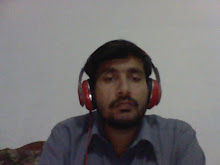Long Question Answers Chapter No.4
i.
Describe
the components of communication system with the help of diagram.
Ans: Components
of a Communication System:
Communication
system consists of the following five basic components;
i.
Sender
ii.
Receiver
iii.
Message
iv.
Transmission Medium
v.
Protocol
Sender:
It is the device which
sends the message. In other words, it is the source of message that can be a
computer, telephone or any other device.
Receiver:
It is the device which
receives the message. In other words, it is the destination of message that can
be a computer, radio , telephone or any other device.
Message:
It is the data to be
transmitted. It can be text, graphics, image, sound or video.
Transmission Medium:
It is the physical pathway over which the message is send from sender to receiver. Some examples of transmission media are coaxial cable, fiber optic cable and microwaves etc.
Protocol:
It is the set of rules
between the two communicating devices that governs the process of data
communication. Without a protocol, two devices may be connected but they cannot
communicate with each other.
➤➤➤➤➤➤➤➤➤➤➤➤
ii.
Explain asynchronous and synchronous
transmission modes with examples.
Ans: Asynchronous
Transmission:
The transmission mode in which time
interval between each character is not the
same is known as asynchronous transmission. Some of the features of this transmission are;
same is known as asynchronous transmission. Some of the features of this transmission are;
I. Each
character is transmitted with additional control information.Control information consists of additional start and stop bits. These bits indicate
the start and stop of transmission.
the start and stop of transmission.
Start bit is 0 and stop is 1.
II.
The
characters are transmitted at uniform time intervals.
III. This
transmission is slow because additional bits transmitted with each character.
synchronous
Transmission:
The
transmission mode in which time interval between the characters is always the same, is known as synchronous transmission. Some of the features of this transmission are;
I. There is no control information added with the characters.
II.
0s and
1s bits are transmitted as one long stream of bits. The receiver count these
bits.
III.
This
transmission is faster than asynchronous because it does not require extra start and stop bits.
➤➤➤➤➤➤➤➤➤➤➤➤
iii. Describe the following guided media.
Ans: Twisted
Pair Cable:
It is
the most commonly used cable for data communication. It consists of pairs of
copper wires twisted around one another. The purpose of twisting is to reduce
cross talk and electromagnetic interference. Transmission speed of twisted pair
cable ranges from 2 million bits per second to 10 billion bits per second.
Example: Telephone cable consists of two twisted
insulated wires, computer network cable consists of 4 pairs of twisted cables.
Co-axial Cable:
It is used for local area
networks and cable television systems. It consists of copper wire surrounded by
insulating layer. The insulating layer itself is surrounded by conductive
layer. Insulation reduces interference and distortion. Transmission speed
ranges from 200 million bits per second to more than 500 million bits per
second.
Fiber Optic Cable:
Fiber optic cable consists
of smooth hair-thin strands of transparent material. In fiber optic
communication, the transmitter has a converter that converts electrical signals
into light waves. These light waves are transmitted over the fiber optic cable.
Another converter is placed at the receiving end that converts the light waves
back to electrical signals.
A single fiber optic cable
can carry up to 50,000 communication lines. It provides high quality
transmission at extremely fast speed. It can transmit trillions of bits per
second. It is not affected by electromagnetic fields and can transmit both
analog and digital signals. It is used for data transmission over long
distance.
➤➤➤➤➤➤➤➤➤➤➤➤
iv. Describe any three types of unguided media.
Ans: Unguided Media:
Unguided media signals travel
through open space and nothing
guides them along any
specific path. They do not use cables for data
transmission.
Types of Unguided Media:
Unguided
media can be classified into radio waves, microwave,
infra-red and satellite
communication .
Radio Waves:
They
are electromagnetic waves that are propagated by antennas.
Radio transmission
consists of a transmitter and a receiver. A transmitter
transmits a radio signal to a
receiver which receives it. Radio waves are used
to transmit music, conversation,
pictures and data. Data can be transmitted
over a long distance using
radio waves. These waves are invisible and
undetectable to human
beings.
The following are some
applications of radio waves:
i. Radio and television broadcast.
ii. Cell Phone communication.
iii. Radio controlled toys.
iv. Satellite communication.
v. Wireless networks and wireless Internet.
Microwave:
Microwave
signals travel through open space like radio waves. They
provide much faster
transmission rate than telephone lines or co-axial cables.
They are installed on high
buildings or high towers. They are used for satellite
communication and other long
distance wireless communication.
Infra-Red:
These
waves are light energy that we cannot see. It travels through
space at the speed of light.
It is used for short distance communication. They
are usually used in remote
controls for television, DVD players and other
similar devices. They are also
used in industrial, scientific and medical
appliances.
Bluetooth:
Bluetooth
is a wireless communication technology that uses radio
waves to connect portable electronic devices
over short distance. These
devices include mobile phone, laptop, mouse ,
keyboard, wireless speaker,
wireless headset and pc etc.
Bluetooth technology can transmit text, image,
voice and video.
Satellite:
A
satellite is an object that is placed in an orbit around the earth and
revolves around it with speed
that is slightly faster than Earth’s average orbital
speed for communication. It is
a wireless reciver and transmitter used for
transmitting data over long
distance at high speed.
Ground stations beam signals
through antennas to satellite. Satellite amplify
and retransmit the signals to
another ground station which can be located
many thousands of miles
away.
➤➤➤➤➤➤➤➤➤➤➤➤
v. Describe the functions of the following communication devices.
Ans: Router:
Router is the communication device that is
used when two networks have to be connected for communication. They send
information from one network to another by selecting the best pathway
available.
Types of Routers:
There are two types of routers
a.
Wired Router.
b.
Wireless Router.
Network Interface Card(NIC):
Network interface card or simply network
card is used to connect computers together to create computer network. It makes
communication between computers possible it is installed on the motherboard, in
modern computers it is integrated on the motherboard.
Types of NIC card:
a.
Wired network card.
b.
Wireless network card.
Switch/Access Point:
A switch or access point is used for
connecting computers together in local area network. Switch is used in wired
networks whereas access point is used in wireless networks. A switch/access
point receives information from a computer in the network, inspects it and then
transmits it to the destination computer.
➤➤➤➤➤➤➤➤➤➤➤➤
Fbise Notes-Computer | Data Communication Chapter No.4 Long Questions
 Reviewed by fbisenotes
on
July 15, 2019
Rating:
Reviewed by fbisenotes
on
July 15, 2019
Rating:
 Reviewed by fbisenotes
on
July 15, 2019
Rating:
Reviewed by fbisenotes
on
July 15, 2019
Rating:



















No comments: